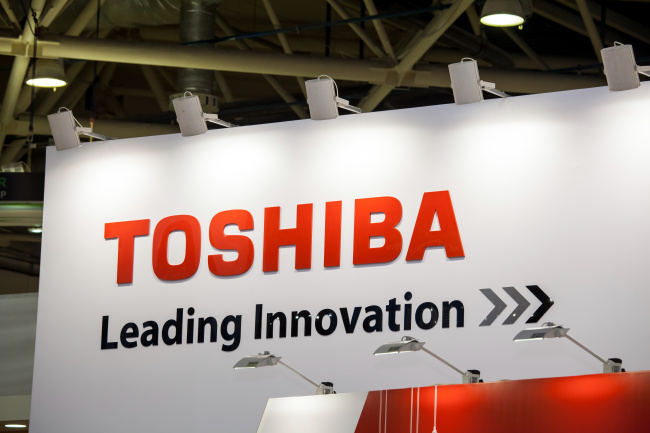Experts predict China to approve Toshiba deal after meticulous calculation
SK hynix pins hope on Toshiba’s determination to push for sale of memory business
By Song Su-hyunPublished : May 10, 2018 - 17:33
In response to re-emerging concerns about the possible fallout of Toshiba’s deal to sell its memory business to a global consortium by the end of June, trade and semiconductor industry experts in South Korea say China would approve the deal in the end, but after meticulously calculating its interests.
Korean trade and semiconductor experts both cite China’s ‘Made in China 2025’ plan as a major reason for the Toshiba deal being delayed for several months.
“By international trade customs and rules, it will be difficult for China to stick to opposing the acquisition of the Japanese memory business by the global consortium,” said Yang Jun-sok, a trade professor at the Catholic University of Korea. “China would give the green light for the deal in the end, but based on a confirmation that the deal wouldn’t hurt its semiconductor industry.”
China may instead consider putting restrictions on imports of those products after approving the sale of the Toshiba memory unit to the US-Korea-Japan consortium in light of the country’s antitrust regulations, the professor said.
China is the only country that has not granted approval for the deal among eight countries that have semiconductor industries that are of significant sizes and have been selected by international rules on mergers and acquisitions to deliberate the impact of the deal.
Toshiba’s management had vowed to complete the sale by March, but did not achieve this goal due to the delay in China.
It is also seeking to win the Chinese approval by mid-May in order to end the process before the end of June when an annual shareholders meeting is scheduled.
However, some news reports are saying that the Toshiba management might withdraw the deal as its financial situation has improved compared to a year earlier.
Korean trade and semiconductor experts both cite China’s ‘Made in China 2025’ plan as a major reason for the Toshiba deal being delayed for several months.
“By international trade customs and rules, it will be difficult for China to stick to opposing the acquisition of the Japanese memory business by the global consortium,” said Yang Jun-sok, a trade professor at the Catholic University of Korea. “China would give the green light for the deal in the end, but based on a confirmation that the deal wouldn’t hurt its semiconductor industry.”
China may instead consider putting restrictions on imports of those products after approving the sale of the Toshiba memory unit to the US-Korea-Japan consortium in light of the country’s antitrust regulations, the professor said.
China is the only country that has not granted approval for the deal among eight countries that have semiconductor industries that are of significant sizes and have been selected by international rules on mergers and acquisitions to deliberate the impact of the deal.
Toshiba’s management had vowed to complete the sale by March, but did not achieve this goal due to the delay in China.
It is also seeking to win the Chinese approval by mid-May in order to end the process before the end of June when an annual shareholders meeting is scheduled.
However, some news reports are saying that the Toshiba management might withdraw the deal as its financial situation has improved compared to a year earlier.

“The Chinese government’s plan to make the country a high-tech superpower by 2025 may be affecting the authority’s decision to approve the deal,” said Yoo Hoi-jun, a professor at the Korea Advanced Institute of Technology.
“It would want to take some time to set measures to secure technological know-how from rival countries like Japan and Korea, and balance its interests and losses, before approving the deal.”
The professor noted that there are significant increases in the number of Japanese engineers working for Chinese and Taiwanese memory chipmakers.
Considering the phenomenon, the Chinese government would want to seek some cooperation from Japan, while Japan is also indirectly supporting China’s plan, Yoo said.
Regarding the postponement of the deal, one of the consortium’s members, SK hynix, the world’s second-largest memory provider, is pinning hopes on strong determination by the Toshiba management to try selling the business.
“Our official stance is aligned with Toshiba’s latest announcement to continue the deal,” said an SK hynix official.
Toshiba decided to sell its memory unit to the global consortium for about $17.6 billion in September, and Korea’s SK hynix announced it would inject $3.5 billion into the deal.
By Song Su-hyun (song@heraldcorp.com)


















![[Today’s K-pop] BTS pop-up event to come to Seoul](http://res.heraldm.com/phpwas/restmb_idxmake.php?idx=642&simg=/content/image/2024/04/17/20240417050734_0.jpg&u=)